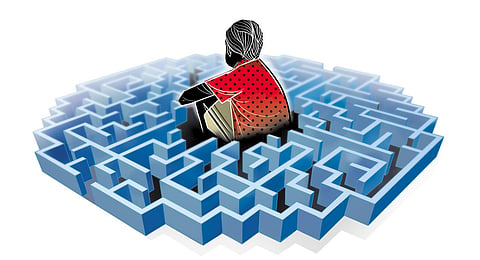

The topic was “An achievement your child had made in the past three months”. It reduced Murugan to tears, so badly that he needed several moments to compose himself. And finally when he did speak, he voices the fears, concerns and confusion facing every parent of an autistic child.
“I have taken my son to 10 doctors and we still don’t know what is wrong. Sometimes he’s ok but sometimes he gets angry and can be violent and even hit us," he says. "We let it go because he is a child. But we don’t understand why he gets angry, why he hits us.... We don’t know what to do.”
But surely there was an achievement, Dr Parasuram Ramamurthi and Andrew Nelson press. “Yes, he has started speaking more regularly now,” Murugan smiles. Ramamurthi and Nelson lead the audience of similar parents in applause. This is what the Arts for Autism Festival held last weekend in Madurai was about. Celebrating autistic children and accepting them as they are. For the parents though, the workshop also meant a sharing of experiences and resources and finding support in strangers.
Diagnosis, for instance, is a common cause of anguish. Dr Devaki from Chennai finds that being a doctor doesn’t make life simpler. Realising that her son might have a problem when he was two and hadn’t started speaking, she and her husband took him to a paediatrician who referred them to an ENT specialist, who sent them to a speech therapist. Eventually the family ended up with a psychiatrist, but still no definitive diagnosis happened. “Finally we went to NIMHANS in Bangalore," reveals Devaki. "There, a panel comprising a paediatrician, psychiatrist, psychologist, social worker and other professionals gave us a final and conclusive diagnosis. Our son has a disorder that falls under the autistic spectrum and lacks social and communication skills. On the bright side, we have discovered that he is an excellent drummer,” she smiles.
Indeed, festival post-lunch sessions were full of the 14-year-old blissfully drumming the beats of the latest Tamil dance numbers before an awestruck audience of adults. But Devaki’s harrowing experience wasn’t a one-off story. Ashok Ramadurai, a musician, faced a more difficult journey, which also ended up at NIMHANS. His son, Shyam, was a happy, outgoing, intelligent child — but all that changed as the boy entered his teens. “He became very withdrawn and anti-social. He was extremely shy at school. So we went to a psychologist who said he was suffering from schizophrenia," Ashok explaines. "We took him to a senior psychiatrist in Madurai. That doctor put him on psychiatric medication. Then we took him to a psychiatrist in Chennai who put him on another combination of medications for schizophrenia." Despite all this, Shyam managed to finish his second year of undergraduation. "Finally we took him to NIMHANS were we stayed for almost a month. He was diagnosed as having a disorder that fell under the autistic spectrum, his only problem being with his social skills.” Much like Devaki’s son, Shyam, now 19, too found his calling in music, with an excellent singing voice that he displayed at the workshop.
Devaki and Ashok are among the more fortunate. Other parents, especially of younger children, are still confused and at a loss over the next step to take.
Murugan’s wife Pramila, for instance, says that their nine-year-old son has gone through four schools so far, and though very talented with computers, they don’t know what to do beyond a point. “He has ADHD (attention-deficit hyperactivity disorder) and was on such strong medication that he could barely sit up. My husband and I were so scared that we stopped the medication and decided to deal with his hyperactivity. The problem is that doctors give us a diagnosis and medication but beyond that there are such limited resources when it comes to helping our children and developing their talents,” she shrugs.
Similarly, Shanthi, who moved to Madurai from Chennai, is considering returning to the city. “There are more options. We tried employing a special educator to come home for our six-year-old son but I realised I was teaching him more than that person. He goes to a normal school but he doesn’t study even though he writes very well,” she trails off.
The three-day fest, however, gave parents several options. Through drama therapy, a speciality of Ramamurthi who teaches at the Madurai Kamaraj University, parents were taught games to play at home which would increase their understanding of their child’s world and help the child to better adapt to non-verbal cues of the outside world. Children and parents let loose in painting and music workshops while learning how to use masks to improve focus, eye contact as well as to draw the child into social interaction. By the end of the second day, parents were bonding with one another, while several of the children too had managed to find friends.
“This is what we want to encourage. Parents need to form their own support groups and meet regularly to ensure their children have space and opportunity for social interaction,” Ramamurthi explains. “We will not help our children by hiding them and protecting them from interaction.”
Ultimately, one must let go. As Tamilarasi, mother of an extremely curious Kumar, who only draws smiles from her when he persists in yelling or rolling on the floor, says, “He goes to a special school and we have never had any idea or plans of what he should become. He loves trains and engines and wants to become an engine driver. Whatever he wants is fine with us,” she smiles.
(Some names have been changed)
— ranjithagunasekaran@epmltd.com